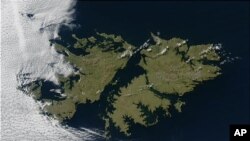The decades-long stalemate between Britain and Argentina over the Falkland Islands is heating up again.
British military officials say they intend to complete an ongoing series of military maneuvers – which include missile tests – on and near the island chain soon. Those tests have been criticized as “acts of aggression" by Argentina’s Foreign Minister, Hector Timmerman.
Known as "Las Malvinas" in Argentina, the archipelago has been under British control since 1833, and prompted a short but deadly war in 1982 between Argentina and the U.K.
Argentina’s President, Cristina Fernandez de Kirchner, calls the current situation “very grave,” while Britain’s Secretary of State for Defense, Dr. Liam Fox, tells the BBC, “If anyone thinks that the Falklands Islands defense is weak, they should think again.”
Hugh Bicheno is a Briton who knows Argentina from the inside - he's a former foreign service officer there.
These days he writes histories from his home in Britain. One of them is "Razor's Edge: The Unofficial History of the Falklands War." VOA talked with Mr. Bicheno about the Falklands situation.
Why are these islands so important for both of these nations?
In the case of the Argentines, it’s an "irredemptor," it’s an unclaimed piece of "Fatherland," which is always very important to fascistic regimes. Peron would never have been so stupid as to invade them; they’re much more useful as something they can point to and rouse their followers to beat their drums and say "Las Malvinas son Argentinas.” As to the British, they’re important because the British had to fight a war over them.
Don’t forget: Argentina is probably the only place in the entire continent where nationalism is defined against some country other than the United States. It also gives the U.S. a little diplomatic wiggle room on a continent where you’ve got your Chavezs and all these other people who are anti-U.S., it’s kind of a relief to have someone who’s anti-Brit.
Given that, what kind of pressure is the U.S. under right now, in that both Argentina and Britain are turning to the U.S. for support?
The U.S. is in the cat bird seat. Britain could not possibly have retaken the islands back in 1982 without the whole-hearted assistance of Sir “Cap” Weinberger – please note he got a knighthood out of it – and ultimately of President Reagan. Right now, basically all the Brits don’t want Washington to do is let the Argentines think that they can do it again.
The [Argentine] military situation is incomparably weaker. They have, for what it’s worth, the full support of all of Spanish-America, and a little word from Secretary of State Clinton that she does wish both sides could get down and talk about it. Well, unfortunately she can wish that all she likes, but you can’t have negotiations when the minimum demand of one side is greater than the maximum concession the other side can make.
What is life like on the Falklands?
Bleak. There’s not a tree on all of the islands. The wind blows perpetually – you’re talking about a 30 mile-an-hour (48km/hour) wind that’s standard. It’s wet – the geology is such that you hit ground water at about six inches (15cm), so anywhere you go you get wet feet. It’s good for penguins and albatrosses and seals and killer whales. But I was brought up in the tropics; as far as I’m concerned it’s pretty close to Hell.





